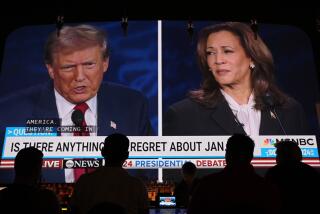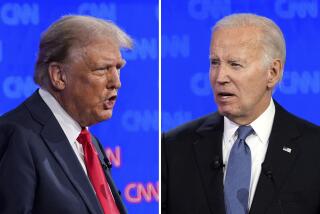CAMPAIGN 2000
- Share via
In the rematch of brains and grins, grins got the best sound bites.
Grins--that is to say, George W. Bush--was better off sitting down for Wednesday night’s debate, in contrast to last week’s debate in Boston, when the opponents stood. Bush is a conversational kind of guy; the same chumminess that made Dick Cheney look good in the vice presidential debate in Kentucky also helped Bush in North Carolina. Brains--that is, Al Gore--was better off with the more formal stand-up format; his oratorical style plays better at a distance.
Both men took criticism for their performance in that first debate in Boston. Yet after a week’s worth of spin, observers concluded that, given a choice between Bush’s butchering the language and Gore’s butchering the truth, the plain-spoken lightweight was preferable to the gratuitously deceptive middleweight. And the voters seemed to agree; Bush has climbed steadily in the polls.
On Wednesday night, Bush was able to deliver a bit of self-deprecation: “I’ve been known to mangle a syllable or two myself,” he quipped, making “syllable” rhyme with “babble.” Gore, on the defensive for last week’s performance that was, by turns, impressive, overbearing and untrue, also tried to make amends. But whereas Bush let some of the steam out of the valve with humor, Gore leadenly alluded to his past problems: “I don’t want to jump in,” he said at one point. Indeed, for the entire debate, Gore seemed as if he were waiting to exhale.
What does such minor verbal wordplay and body language have to do with being a good president? Not much. But it does have to do with winning an election, in part because the voters are auditioning the man who will be on their living room TV for the next four years. As the Canadian media theorist Marshall (‘the medium is the message’) McLuhan observed four decades ago, television is a “cool” medium; it rewards low-key figures who fit into the conversation. After all, thanks to TV close-ups, nobody has to strain to hear what the speaker is saying; one can simply turn up the volume. And so the speaker doesn’t have to.
Bush’s easygoingness was much evident in the foreign policy discussion, which covered the first half of the debate. On issues such as violence in the Middle East and the fall of Slobodan Milosevic, the Texan offered no criticism of the Clinton-Gore administration’s policies; he was so agreeable, in fact, that he joked, “It seems like we’re having a big love fest.” Indeed, Bush even flanked a bit to the left, as when he suggested, “We ought to be forgiving Third World debt under certain conditions,” and mentioned rain forest preservation schemes as one such condition.
Still, amid all the bonhomie, a significant difference emerged. On the basic dividing line in U.S. foreign policy--the “realist” tradition, epitomized by President Theodore Roosevelt, vs. the “ idealist” tradition, epitomized by President Woodrow Wilson--Bush and Gore ended up on opposite sides. Roosevelt, president from 1901 to 1909, celebrated national interest--’carry a big stick’--while Wilson, in office from 1913 to 1921, thought in international terms--’the war to end all wars.”
When theory comes to practice, though, the distinctions become less clear. When Wilson led the U.S. into World War I, he did so in the name of high-minded international law; yet Roosevelt, champion of realistic practicality, was strongly supportive. Bush and Gore may think of themselves as much different, but in all likelihood, their presidential foreign policies would show great continuity with those of Bill Clinton--and Clinton himself didn’t deviate much from the foreign policies of George H. W. Bush.
The second half of the debate shifted to domestic issues, where Bush proved to be better briefed than he was last time, factoid-wise. And when pressed to defend his gubernatorial record, he embodied the spiky Lone Star adage: Don’t mess with Texas.
But Bush seems to figure that if he can keep his calm and sense of humor, he can lose to Gore on debate points and still win the election. For his part, Gore has yet to find a good groove. He’s got the factual particulars, but he still needs an effective television persona.
More to Read
Get the L.A. Times Politics newsletter
Deeply reported insights into legislation, politics and policy from Sacramento, Washington and beyond. In your inbox twice per week.
You may occasionally receive promotional content from the Los Angeles Times.










